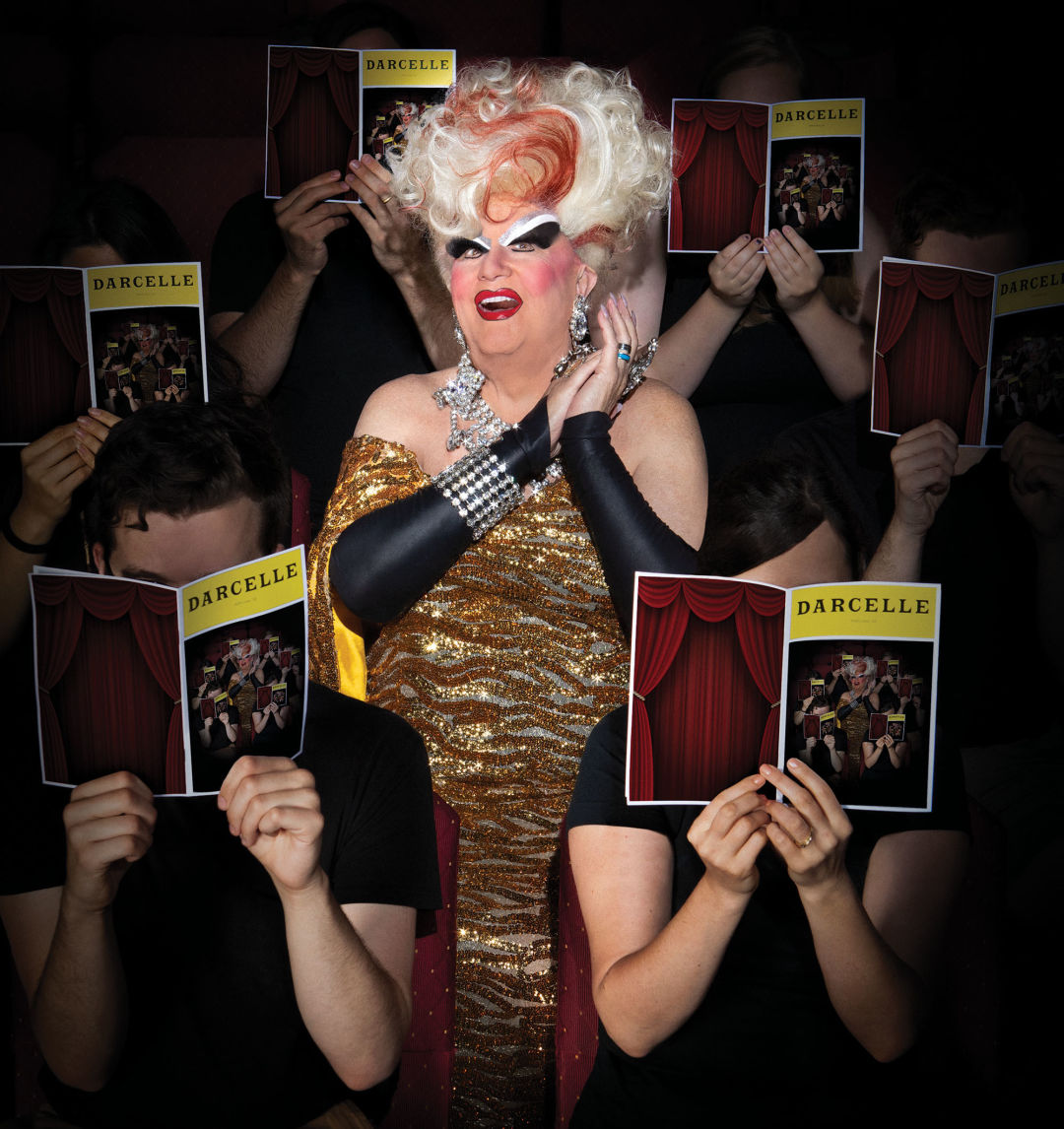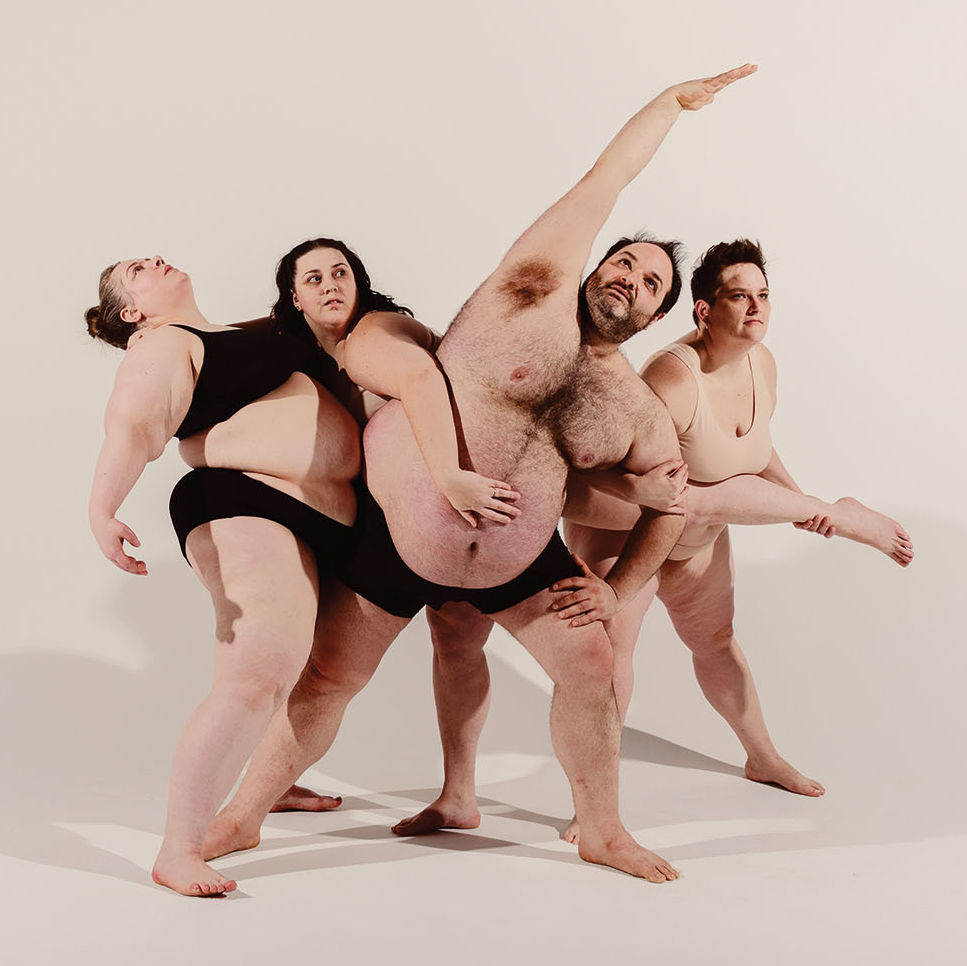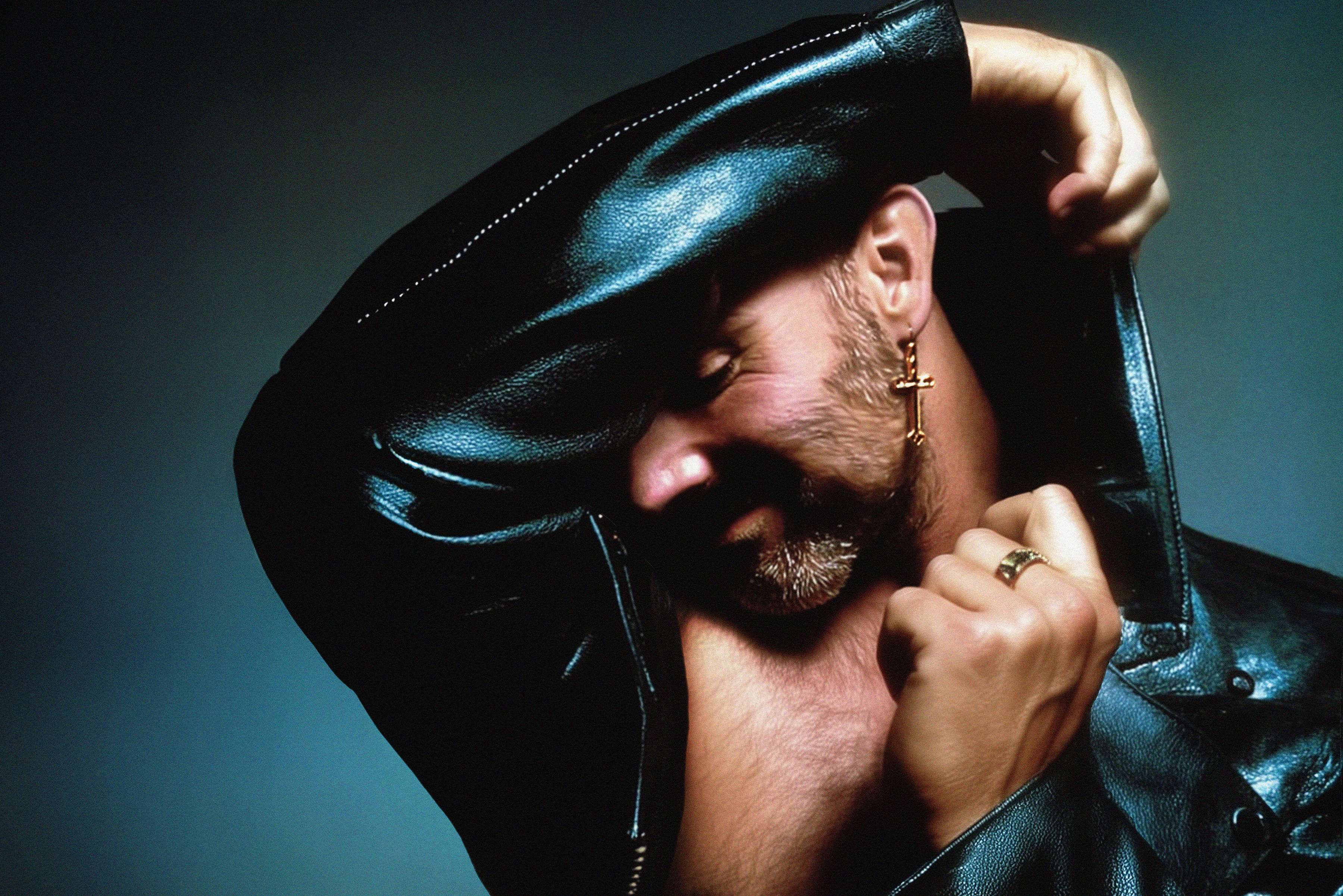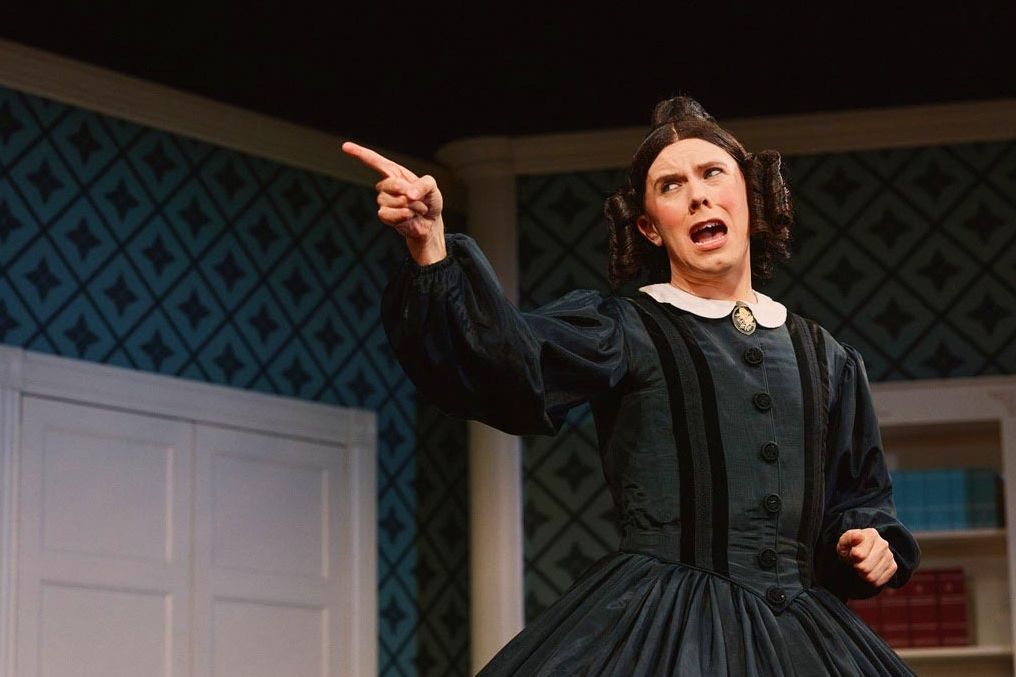The Life of Drag Legend Darcelle Is Becoming a Musical

Image: Christopher Dibble
Here’s something remarkable that’s easy to take for granted. For a half-century now, Portlanders have been able to slip into a shoebox-size club in Old Town to sip fruity cocktails—these days, from souvenir glasses in the form of shapely lady legs—and watch a parade of performers in blindingly glittery gowns, bouffant wigs, and industrial-strength eyeshadow lip-sync to the likes of Judy Collins, Cher, and Olivia Newton-John. In 2019, an era when RuPaul’s Drag Race is a mass culture spectator sport, videos of college football players strutting in stilettos go viral, and New York magazine devotes a cover story to “The Most Powerful Drag Queens in America,” the drag club known as Darcelle XV Showplace can seem almost commonplace, a Portland institution barely worth the bat of a mascaraed eye.
But consider this: When Walter Cole, a.k.a. Darcelle XV herself, opened the club in 1967, drag queens weren’t leading storytime at the library. Stonewall was two years away. Oregon hadn’t decriminalized sodomy. RuPaul was in elementary school.
Darcelle has stayed the course for 52 years. It was the culture that finally caught up.
That left Don Horn, the perennially barefooted founder and executive director of theater company Triangle Productions, with a nagging question. How had Cole kept at it? “After all this time, I still don’t know how that happens,” says Horn, shaking his head in the lobby of his NE Sandy Boulevard theater.
Cole, sitting next to Horn, doesn’t flinch. “Ignorance,” he deadpans.
Horn laughs. “But do you know what I’m saying?” he says, marveling at Cole’s longevity. “He’s been here longer than Starbucks.”
Spoiler: Horn didn’t get any easy answers. But his quest led to two and a half years of weekly conversations with Cole, now 88 years old, about how a poor, bullied kid from Linnton became the (Guinness-certified!) oldest working drag queen in the world. And those chats have culminated in an original musical based on Cole’s life, featuring a score with tunes by Storm Large, Quarterflash, and Tom Grant. Set to premiere this September, That’s No Lady tells a song-fueled story of overcoming the odds to find love and acceptance amid sequins, feathers, and bawdy jokes—and how, in the process, Cole became the closest thing Portland has to a patron saint.
An accompanying exhibit at the Oregon Historical Society will showcase several of Cole’s painstakingly created costumes (among the specimens: a 12-pound hand-beaded gown and a light-up Christmas tree dress with matching headpiece). Horn also has a 700-page (you read that right) biography in the works.
Cole, who won’t appear in the musical—but who’s still at the club four nights a week—takes the attention in stride. “I’m not at all impressed the whole world knows who I am. I mean, I’m excited and I’m thankful, but I’m not, ‘Wow, look at me!’” he says. “I still feel very humbled and very proud that people take their time to say hello.”
That's No Lady, which draws its name from one of Darcelle’s taglines, flings audiences back to 1967, where they meet a very different version of the city’s grande dame of drag. At the time, Cole, who’d previously operated a bohemian coffeehouse and after-hours jazz club, had just bought a skid row dive called Demas Tavern, which had quickly become a popular lesbian hangout. As the musical tells it, 1967 brought Cole two fateful encounters. First: Jerry Ferris, better known as Tina Sandel, who stunned Cole by entering the Demas bathroom done up as a woman and exiting looking like a man. And second: Roc “Roxy” Neuhardt, a dancer and choreographer at the Hoyt Hotel’s Roaring 20s club in Old Town, who would become Cole’s romantic and creative partner. That year, at age 37, Cole donned a dress for the first time.
As the musical chronicles Cole’s personal awakening—Tina slays him with her rendition of “Proud Mary,” Roxy rouges his cheeks—and the transformation of Demas to Darcelle’s, the show also flashes further back to tackle some tough terrain. We hear about the death of Cole’s mother and his subsequent sexual abuse at the hands of his father. He recounts coming out to his wife, Jean, and their two children.
That’s ground Cole covered in his 2010 memoir, Just Call Me Darcelle, and in a one-man play that followed, directed by Horn. As in that solo show, Horn hopes to underscore how Cole has channeled a history of abuse and alienation into lavishing warmth and affection: on his cadre of queens, some of whom have worked at the club for more than 25 years; on his audiences, who’ll rush the stage for a curtain-call kiss; and on the charities to which he’s devoted countless hours.
“Look what he’s done with his life,” Horn says. “He’s loved everybody else. You can stop the madness.”
Not to say That’s No Lady is some sentimental weepie. While it does mine painful territory, it also seeks to conjure the raucous, often raunchy environment of the club, a place where the real-life Darcelle regularly ribs bachelorette parties (on a recent Friday, he cast an aghast look at a bride-to-be who told him she was dressing her bridesmaids in gray) and still performs the “Rhinestone Cowboy” routine in assless chaps. (“I’ve been told it looks like a 40-year-old’s,” says Cole of what shows through, “so thank you very much.”)
So, yes, expect genitalia jokes in the musical. But also seven original songs: collaborations between Horn, who wrote the lyrics, and local musicians. Rindy and Marv Ross of ’80s rock band Quarterflash supplied a comic ditty. Pink Martini vocalist Storm Large composed the closing number, a heartfelt ballad dedicated to Neuhardt, who died in 2017.
Of the contributors, pianist Tom Grant had the earliest brush with Cole. Back around 1963, when Grant was still in high school, he booked his first-ever professional gigs at a downtown coffeehouse owned by Cole. Grant’s jazz trio played regular Fridays and Saturdays at Caffé Espresso, a place Grant recalls as “a hopping little joint” populated by “some serious beatniks.” Cole, he says, was “very shy.”
“That was the beginning of my career,” Grant says. “My parents died young, and those were the only gigs they ever saw me do. So as a memory, they’re really important.”
The two wouldn’t cross paths for another 30 years, when Grant hired Cole to perform as Darcelle at his then-wife’s birthday party. (His memories are foggy, but he does remember a kid blurting out, “That’s a man!” Much giggling ensued.) Grant was honored when Horn asked him to compose a song about Cole’s beloved Aunt Lil; the result is a sweet, wistful number.
Of course, it wouldn’t be a proper homage without lip-syncing: snatches of “Boogie Woogie Bugle Boy,” “Cell Block Tango,” and “Send in the Clowns” pop up in the show.
Brandon Woolley, who’s directing, hopes these moments serve as theatrical caffeine, little emotional exclamation marks that also help summon the sincerity and spirit of the club. As research, he’s been watching VHS tapes of ’70s- and ’80s-era Darcelle XV shows.
“There’s so much heart to these performers, [who] are really just getting at the story of the song itself,” he says. Compare that to the high sheen and fame-hungry fever of Drag Race. At Darcelle’s, Woolley says, “They are leaving it all out there on the stage [in a way] that is so authentic.”
For artist Pepper Pepper, who’s among the new guard of Portland drag—and who once worked as a cocktail server at the club—it’s Darcelle’s constancy in the face of capricious tastes that most impresses. “Her act was the only thing, then it was the popular thing, then it was the usual thing, then it was the old thing, and now it’s the special thing again,” says Pepper.
As for the prodigious task of embodying the bespangled titaness herself? That falls to Kevin Loomis, a Corvallis-raised actor who’s spent most of his career in New York City. (His TV credits include “Rich S.O.B.” on short-lived series Deception and “Clown #1” on She Spies, an early-aughts action-adventure show.) Loomis, who has no drag background—discounting that one time he was hired to jump out of a cake in Seattle—hadn’t been to Darcelle’s in some 20 or 25 years when he returned to Oregon in June. Horn says Loomis’s lack of drag experience is a boon; his sense of
discovery mirrors what audiences will see happening to Cole onstage.
“It’s a bit daunting playing a Portland icon that’s still living, that people see every week,” Loomis says. “[But] I think he trusts me. He said I was handsome enough to play him.”
Horn never did nail down exactly how Darcelle keeps at it. But to Cole, it’s simple. “I’ve never, in all these years, ever sat at home and said, ‘I really don’t want to go in tonight,’” he says. “Never.”
That’s No Lady
Sept 19–Oct 5, Lincoln Hall







